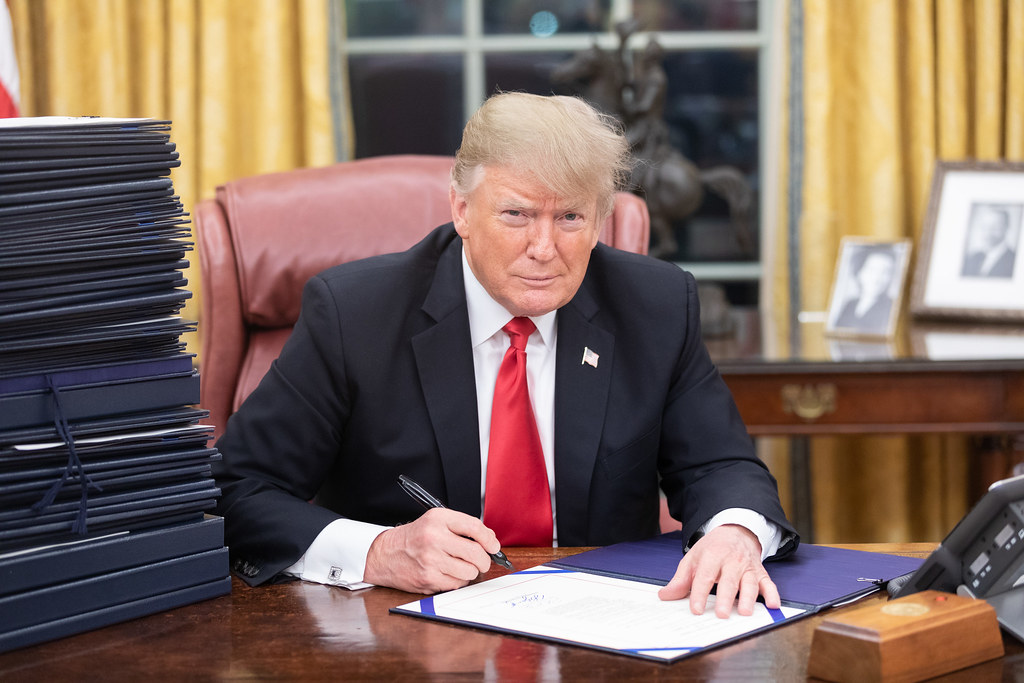Key Takeaways:
- Jonah Goldberg warns that Trump’s use of emergency powers echoes Caesar’s unchecked rule.
- The International Emergency Economic Powers Act was meant for real national crises.
- Trump used these powers to impose tariffs on Brazil and Canada.
- Congressional Republicans weakened oversight, giving up key checks on presidential power.
Understanding Trump’s Emergency Powers
President Donald Trump has claimed broad emergency powers to impose tariffs. He says trade deficits pose a national crisis. Yet a leading columnist sees a dangerous trend. Jonah Goldberg calls it modern “Caesarism.” He warns that giving one man unchecked power can destroy a republic.
How the Law Was Meant to Work
The International Emergency Economic Powers Act of 1977 gave presidents tools during true emergencies. Lawmakers wrote it for war, terrorist attacks, or sudden crises. Every six months, Congress had to review these measures. This rule kept each president in check. No single leader could ignore Congress for long.
But over time, Congress loosened these rules. Now, a president can use these emergency powers for issues Congress never intended. Trump has taken full advantage.
Why Emergency Powers Pose a Threat
Trump’s reasoning treats trade disputes like invasions. He called deficits an “existential threat” to the nation. In Goldberg’s view, that mirrors how Caesar justified his rise to power. Rome once gave Caesar temporary rule to solve military problems. Instead, he made himself “dictator for life.” Later republics fell the same way—until America learned its lesson.
Goldberg argues that calling ordinary issues “emergencies” damages to democracy. When leaders claim the right to act without checks, they edge toward autocracy. In the name of speed or security, they strip away laws and oversight.
Trump’s Use Against Brazil and Canada
In one case, Trump punished Brazil over how it handled a former political ally. He imposed tariffs under the emergency powers law. But Brazil’s actions did not threaten U.S. security. Later, he cited a pro–free trade ad from Canada as another crisis. He slapped tariffs on Canadian steel and aluminum. Neither move met the law’s original test.
Goldberg writes that these moves show a dangerous habit: using emergencies to force political goals. He says real emergencies demand urgent action. But trade tiffs do not qualify. By stretching the law, Trump sets a new, risky standard.
Parallels to Caesar’s Rise
Goldberg draws a clear line from Caesar’s rule to today. He explains that early Rome let one man lead during wars. Yet when war passed, that leader was supposed to step down. Caesar did not. He declared himself ruler for life. That broke Rome’s spirit of shared power.
Similarly, America’s founders warned against giving any one person too much control. Benjamin Franklin famously said we have “a republic, if we can keep it.” Franklin knew republics can die when citizens give away their rights for false emergencies.
In fact, Goldberg reminds us that republics fail not just because tyrants seize power. They fail because lawmakers and voters let them.
Congressional Checks Give Way
Originally, IEEPA required a six-month review of any emergency measures. Congress had to vote to continue or end them. This safeguard forced each president to justify his actions. It kept emergencies rare and legitimate.
However, congressional Republicans changed the rules. They removed or delayed reviews. They gave Trump a free hand. Now Congress cannot easily challenge his emergency declarations. In Goldberg’s words, they “denied themselves the ability to check the authority Trump is abusing.”
Why It Matters Today
Unchecked emergency powers can touch every part of life. Leaders may block funding for programs they dislike. They may freeze assets of political rivals. They may disrupt trade just to win a domestic fight. Each time they do, they chip away at the rule of law.
For a healthy democracy, power must stay balanced. The president needs freedom to act in true crises. Yet Congress and the courts must step in when leaders stretch their authority. Without real checks, one person can reshape the government by fiat.
As Goldberg warns, this is not idle history. It is a living pattern. When one president bends emergency powers, others will follow. Each new move makes it easier for the next leader to claim extreme authority. Soon, ordinary disputes could become “national emergencies.”
What Comes Next
Congress can still reclaim its role. Lawmakers could demand strict reviews of all emergency declarations. They could restore the six-month check. They could define emergencies more clearly. Courts could also rule that tariffs for political gain fall outside the law.
Citizens must stay alert too. A republic only works when people hold leaders accountable. Voters can demand transparency and insist on firm limits. They can push their representatives to resist the temptation of easy executive action.
By learning from Rome’s mistakes, America can safeguard its future. Emergency powers must remain rare tools, not routine tactics.
FAQs
What is the International Emergency Economic Powers Act?
It is a law from 1977 that lets the president act fast during real national emergencies. Originally, it covered wars, terrorism, and threats to U.S. security. It required Congress to review any emergency action every six months.
Can Congress stop a president’s emergency powers?
Yes. Congress can vote to end an emergency declaration. It can also pass laws to limit how and when the president uses those powers. Restoring regular reviews helps keep emergencies in check.
Have other presidents misused emergency powers?
Some past presidents have stretched the law’s intent. Yet none took it as far as using it for routine trade fights. Trump’s broad use against allies stands out as a clear example.
Why does Goldberg compare Trump to Julius Caesar?
Goldberg sees a pattern: rulers claim temporary power to fix issues. Then they hold on and expand their control. Caesar used emergencies to become dictator for life. Goldberg warns that giving up checks opens the door to similar risks today.
